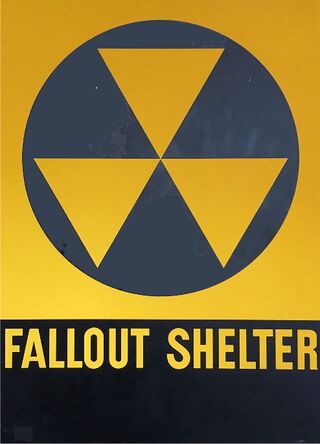Fear
Are Mushroom-Cloud Nightmares Returning?
A nuclear misjudgment is unlikely, but fear of atomic accident is real.
Posted February 28, 2022 Reviewed by Gary Drevitch

I woke a few mornings ago with an irrational fear after reading the New York Times headline, "Russia Attacks as Putin Warns World." That fear was not about the actual attack on an independent democratic country by an authoritative bordering one, though, yes, that is a global catastrophe. Instead, my horror was about the words of Putin’s speech. Words and numbers hit my sensitivities. I am a mathematician by training who pays special attention to analyses of risk. But I am also a science journalist who pays careful attention to words, how they are used, and what they mean.
Cold War redux
Here is an excerpt of Putin’s war message delivered in the early hours (in US time) of the morning of Thursday, February 24, a day that will live in infamy for Russia and Ukraine. The translation to English is by Al Jazeera staff, based on a transcript released by the Russian presidency.
“As for the military sphere, today, modern Russia, even after the collapse of the USSR and the loss of a significant part of its capacity, is one of the most powerful nuclear powers in the world and possesses certain advantages in some of the newest types of weaponry. In this regard, no one should have any doubts that a direct attack on our country will lead to defeat and horrible consequences for any potential aggressor.”
I have no doubt what Putin means. He alludes that Russia has 6,200 nuclear weapons (600 more than the U.S., as if that makes a difference) and has no no-first-use policy with any country other than China.
Not everyone will agree, but Putin goes on to make his clever hint clearer:
“It is only a matter of time: they are getting ready, they are waiting for the right time. Now they also claim to acquire nuclear weapons. We will not allow this to happen.”
Russian nuclear deterrent policy permits the use of nuclear weapons in response to a conventional strike on “critical government facilities and military infrastructure," including cyberattacks. Referring to the Russian nuclear arsenal, he threatened other countries: "Whoever tries to hinder us... should know that a Russian response will be immediate. And it will lead you to such consequences that you have never encountered in your history."
But who am I to say these things? It is better to understand Putin’s consequential statement from the words of Jean-Yves Le Drian, the Russian Foreign Minister. A Reuters reporter asked him if Putin meant the use of nuclear weapons. The reply was that, yes, it should be understood in that way. That is especially frightening because Russia has never agreed to a No-First-Use nuclear policy. In other words, Russia does not commit to never using nuclear weapons first, either as a first strike, in an escalating move in a conventional conflict, or as a response to a non-nuclear attack. And the Times of Israel reported that French President Emanual Macron warned that “Moscow has been given the green light to deploy nuclear arms” in Belarus.
Nucleomituphobia redux
And there is my fear. Not only mine, though. My 15-year-old granddaughter came home from school talking about WWIII starting. It was the buzz in her school. And an older friend in my exercise class was concerned that he had no basement to go to in case of a nuclear attack in the US. It revives the old 1950s nucleomituphobia (fear of nuclear weapons) contagion, when people built bomb shelters irrationally to protect themselves from a nuclear war.
The worry is not rational. World War III is not likely. So when I ask myself if my fear is justified, the answer hangs on what the experts know and tell. I admit my biases of relying on a few people who know about nuclear weapons and wars far more than I do. Tom Nichols, a contributor to the Atlantic, writes, “There are multiple paths to a dangerous nuclear confrontation that could embroil Moscow and Washington in a situation neither of them expects or wants.”
Inevitable accidents of warfare
Reading those words gives a chill that World War III might happen in our lifetime. It’s an irrational fear because it would assume the extremes of Putin’s madness and the typical unavoidable accidents or warfare that could trigger a NATO response.
Under healthy reasoning, we should feel that a nuclear conflict in Ukraine is not likely. But healthy thinking does not always dispel anxieties brought on by ponderings of accidents, misjudgments, and the actions of dictators ignoring consequences of their addiction to power.
The Doomsday Clock is now set as 100 seconds to midnight. That furthers anxiety that midnight is tomorrow, but we also have hope that no nuclear weapons will ever be used in any future conflicts in our lifetimes. As for time beyond our lifetime, we have the work and views of my good friend, former Mayor of Hiroshima, Tadatoshi Akiba. He has been working on the UN Treaty on the Prohibition of Nuclear Weapons after crafting what he calls “A 2040 Vision: An Emergency Campaign to Ban Nuclear Weapons.” Its goal is to abolish nuclear weapons by 2040, with the interim goal of adopting NFU (no-first-use) policies by nuclear-weapon states by 2030.
“My generation,” he says, “might not live until 2040, but we must start somewhere. The '2040 Vision' objective is a dream with a deadline, which I hope becomes a starting point for the younger generation to carry our legacy.”
That 2040 Vision is what keeps the hope that mushroom nightmares will turn into the delights of savory fungi flavors, and perhaps, even delicious truffles.
Meanwhile, Ukrainians are living in an unjustifiable nightmare.
References




